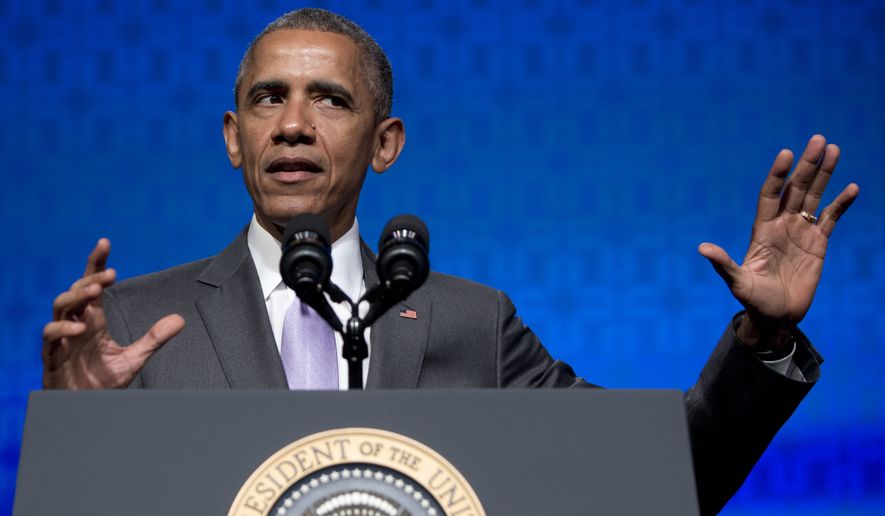Repealing Obamacare would spur the economy, adding more than half a percent to the gross domestic product at the beginning of the next decade, the Congressional Budget Office said in a new analysis Friday that still found repeal would be bad for the federal deficit.
The dual findings could both boost and hurt GOP leaders’ case as they prepare for one last major effort to repeal President Obama’s signature law before he leaves office.
Tens of millions of Americans would lose coverage they’d have under the Affordable Care Act over the next decade, but that loss would chase many of them back into the labor pool, where they would both get insurance through their jobs, and would lead to other current workers putting in more time on the job.
Combined, those would produce an economic boost equal to seven tenths of a percent from 2021 to 2025, the CBO said.
“The subsidies and tax credits for health insurance that the ACA provides to some people are phased out as their income rises — creating an implicit tax on additional earnings — and those subsidies, along with expanded eligibility for Medicaid, generally make it easier for some people to work less or to stop working without losing health insurance coverage. For other people, the act directly imposes higher taxes on labor income, thus discouraging work. Repealing the ACA would reverse those effects,” the CBO said.
It’s the second major report this week from the budget agency and its new director, Keith Hall. The first one, looking at the long-term budget outlook, said the federal fiscal picture is in bad shape and will need major help — and the sooner the better.
Repealing Obamacare, however, won’t help that picture, and will actually lead to $137 billion in new deficits over the next decade, chiefly because a repeal would not only end hefty government health care spending, but would also end the tax hikes Mr. Obama is counting on to pay for that higher spending.
The figure would be much higher, to the tune of $353 billion, without the faster-growing economy that would result from repeal, the CBO said.
“Today’s CBO report is very clear. Any way you slice it, repealing the Affordable Care Act will add hundreds of billions of dollars to the deficit,” House Minority Leader Nancy Pelosi, California Democrat, said.
Repealing Obamacare would increase federal deficits by $137 billion over the 10-year budget window.
GOP leaders, though, swiftly accentuated the report’s findings on the labor market.
“CBO has determined what many in Congress have known all along,” Senate Budget Chairman Mike Enzi, Utah Republican, said. “This law acts as an anchor on our economy by dragging down employment and reducing labor force participation … While CBO’s report notes that the deficit impact of repealing the law is highly uncertain, and could even reduce the deficit, it does show that repealing this law will boost nationwide employment and grow the economy.”
The GOP is hatching a strategy to repeal all or part of Obamacare through a fast-track tool known as “budget reconciliation,” which allows the GOP-led Congress to pass new legislation on a simple majority vote in the Senate.
Mr. Obama could still veto whatever bill they produce, and Republicans must prove to the Senate’s referee, the parliamentarian, that their efforts would reduce — not raise — the deficit.
How Republicans use the tool will depend on whether the Supreme Court this month blows a hole in Obamacare by invalidating the law’s subsidies in at least 34 states that use the federal HealthCare.gov website.
If those subsidies are struck down, the CBO said it would have to redo its estimates to reflect the decrease in government spending and repeal-induced savings, “although the magnitude of those reductions is uncertain and would depend in part on the specific details of the Court’s opinion.”
In the meantime, the GOP-dominated House this week voted to repeal one of Obamacare’s revenue-raising provisions — a 2.3-percent excise tax on medical device makers — with the help of dozens of Democrats who fear the tax is a job killer back home.
Mr. Obama threatened to repeal the bill if it makes it out of the Senate, in part because leaders did not replace the $24 billion that would be lost by repeal, and is needed to pay for other parts of the law.
• Tom Howell Jr. contributed to this article.
• Stephen Dinan can be reached at sdinan@washingtontimes.com.




Please read our comment policy before commenting.